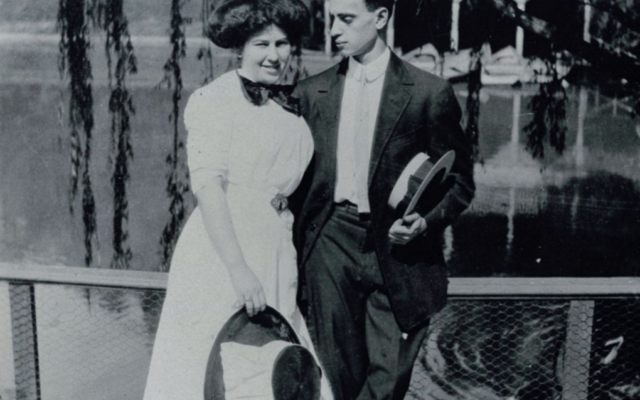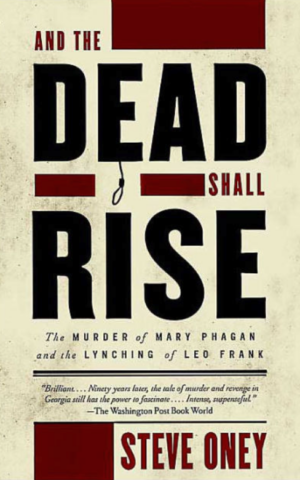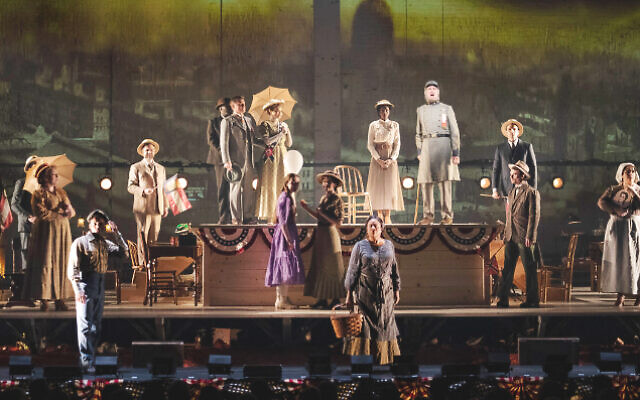‘Parade’ Wins Tony by Focusing on Antisemitism
Success of Broadway revival of the 1998 musical coincides with the resurgence of antisemitism in America and elsewhere in the world.
The Broadway production of “Parade,” a musical drama that recounts the 1913 trial in Atlanta of Leo Frank, the young Jewish manager of a factory here and his subsequent lynching two years later, was among the winners at this year’s Tony awards in New York last month. It won Best Revival of a Musical and Best Director, Michael Arden.
Arden, in his impassioned acceptance speech on the telecast that was streamed and broadcast nationally, recalled the injustice that led to Frank’s killing and warned that it remained highly relevant more than 100 years later.
“’Parade’ tells the story of a life that was cut short at the hands of the belief that one group of people is more or less valuable than another, that they might be more deserving of justice,” Arden said in accepting his award. “This is a belief that is the core of antisemitism, of white supremacy, of homophobia, of transphobia and intolerance of any kind. We must come together. We must battle this. It is so, so important, or else we are doomed to repeat the horrors of our history.”
The original production in 1998 won Tonys for Best Book for Alfred Uhry, who grew up in Atlanta, and Best Score for Jason Robert Brown in his Broadway debut as a composer and lyricist. Brown, earlier this year, was a guest of Neranenah, the Atlanta Jewish music festival, for a question-and-answer session at the Alliance Theater.

The renewed interest in the case has led The Temple, where Frank and his wife Lucille were one-time members, to plan a trip to New York to see the production at the end of July. Uhry, the playwright, is expected at the performance to lead a discussion about the work.
The revival has won praise for its relevance to present day America with the resurgence of antisemitism in communities around the country. The Anti-Defamation League, in its yearly review in March of such activity, reported the number of antisemitic incidents is at its highest level in the country since it first began keeping count in 1979. Over the last six years, it has been reported that the number of attacks has tripled.
During previews in New York, “Parade” was picketed by neo-Nazis, whose sudden appearance in front of the Broadway theater was not unlike the recent antisemitic incident prior to Shabbat services at a Chabad synagogue in Cobb County.
The recognition of “Parade” by the Tony Awards was part of a recent broadcast of “Political Rewind” on Georgia Public Broadcasting’s state-wide radio network.
The host of the program, Bill Nigut, is a former regional director of ADL who was instrumental in helping to place a historical marker at the site of the Frank lynching. Among the guests on the program was Steve Oney, the author of the book, “And The Dead Shall Rise.” The book is the authoritative account of Frank’s ordeal that was first published 20 years ago. The success of “Parade” has propelled the book to the top of Amazon’s list of true-crime nonfiction works.

The case, according to Oney, electrified the Jewish community, particularly those members of The Temple who had prospered in the growth of Atlanta and had worked hard to gain acceptance by their non-Jewish neighbors.
“There was a feeling among Atlanta Jews that they were completely accepted,” Oney said, “which I think is why the Frank case was so shocking, because when Frank was lynched, Atlanta Jews had to question everything about their assumptions about the city that they loved and that they thought love them.”
Oney’s book details the meticulous planning that went into Frank’s kidnapping from the Millegeville, Ga., jail where he was kept and his subsequent hanging. Over the many years he spent researching it, he was able to determine the names of the seven or eight prominent civic leaders of Marietta who decided to kill Frank after his death sentence was commuted by then-Gov. John Slaton. They recruited another 25 members of the community who carried out the raid on the prison presumably with the cooperation of prison authorities. He was lynched on Aug. 17, 1915.
As if to add to the outrageous nature of the crime, there was a brisk trade in souvenirs of the lynching openly for sale in stores here. Needless to say, no one was ever arrested for the murder, but the case led directly to the founding of the Anti-Defamation League. There was the realization by America’s Jews that after the Frank case, antisemitism was not just a problem for Atlanta.
- Arts and Culture
- Opinion
- Bob Bahr
- Parade
- Leo Frank
- Michael Arden
- Antisemitism
- White Supremacy
- homophobia
- transphobia
- intolerance
- Alfred Uhry
- Jason Robert Brown
- Neranenah
- Alliance Theater
- The Temple
- Chabad
- Political Rewind
- Georgia Public Broadcasting
- Bill Nigut
- Steve Oney
- And the Dead Shall Rise
- John Slaton
- broadway




comments